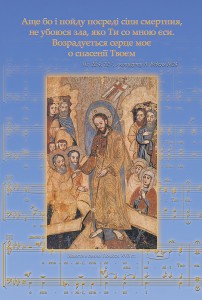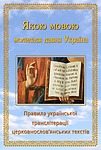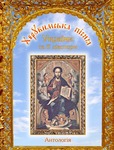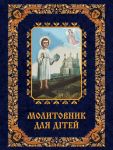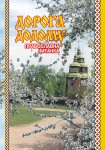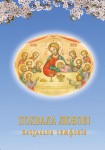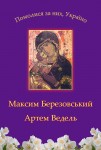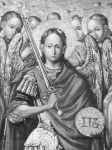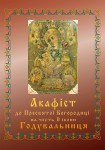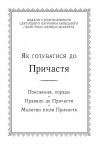Artemy Vedel (1767–1808)
Composer, singer, conductor, violinist-virtuoso, classic of domestic music
always with tears and awesomeness.
Protopope Peter Turchaninov
Righteous man Artemy Vedel. The martyr… Perfect, ingenious… Such he was embodied in the hearts of people.
Future torch was born in gold-headed Kyiv, in family of artist-carver of iconostases Lukyan Vedelsky1. From a child he sang in eparch chorus. He received his education in Kyiv-Mohyla academy where the devotion in the young man fostered from the childhood was strengthened and deepened. The Lord has endowed Artemy with a voice of the rare beauty and range and exclusive sensation of music. In Academy he becomes the conductor of student“s chorus and orchestra, and having seized a violin by own strength, — one of the best violinists of time.
Portrait of Vedel was not saved, in memoirs of contemporaries the verbal image nevertheless was saved:
«He was beautiful, with remarkable radiant eyes which flare special fire of big sincere nobleness and inspiration. He had gentle voice and quiet character, thoughtful face and extreme tactfulness» /V. Zubkovski/.
«Vedel was shapely beautiful young man, with eyes which radiated light. His character was silent, mild, hospitable, but most of all he preferred a solitude … the prayer did not go away from his lips. At least that he did, at least where he went, always on the sly he pronounced the Psalter which he knew by heart, and often he broke into tears, reciting drawlingly songs of the King-Psalmodist … In conversations he was constrained, was silent more and always was thoughtful» /V. Askochenski/.
«He had perfect face, beautiful constitution, godliness shone in all his acts … Many parents wished to give for him their daughters, but he was such pure and virtuous that always avoided female presence, and never did not visit anybody, except teachers of Academy … With companions he joked, and treated them as it is possible better, and having seen off them, became on a prayer, sometimes the most part of night he stood in a prayer» /prot. Peter Turchaninov/.
Being at home, Vedel always read the Sacred Letter and works of Sacred Fathers. Often he came under eternal poplars of Bratsky monastery and wrote music: created it, according to casual eyewitnesses, with tears.
Students mentioned that never saw the conductor angered, he did not raise on them voice at all; corrected errors mildly, with a smile. Extreme sensitivity and emotionality of composer appeared only in music — prayer in which he put all fire of his just heart.
Vedel is almost the unique ingenious composer who has not written any secular work. He lived by prayer, burning with love to God, displaying in himself, as in the lamp, an image of Him, to Whom he was converted with all his heart and to Whom he ministered with all his live…
The academic chorus under Vedel’s conducting has reached heights of skill and has received the big glory. As best musician, under the patronage of the Kyiv metropolitan, he was sent to Moscow to supervise over known chorus of the governor general Yeropkin. Soon this chorus gets glory which has been based not only on brilliant skill of singers, and even more — on a deep shock from heard works of the Ukrainian composer and from his voice of unsurpassed beauty.
Works of Vedel become widely known, executing of them was considered as honor, performances pass with immutable success, highest noble men in eager rivalry invite the most famous master — handsome man. An outstanding career is slightly opened before author, but he … leaves Moscow and comes back «in a province» — home. And never feels sorry about it.
In Kyiv in the beginning of 1794 composer has headed known chorus of general Levanidov. The most fruitful Vedel’s period of creativity — both as conductor, and as singer, and as composer — then has begun.
In chorus of Levanidov Vedel has met 15-year-old singer Peter Turchaninov, has grown fond of him as the son, took to himself and learnt him to composition and singing art. The outstanding church composer protopope Peter Turchaninov mentioned the trainer with gratitude tears all his life. And even in the autobiography he has devoted the most part of memoirs to heart-blood teacher. The example of real man of faith amazed the young pupil and motivated to inheritance. Every day Vedel went to church for early mass, often took communion, fasted strictly, under the charter, did not break even dry-eating; some meat did not eat absolutely as the friar, slept on rough felt. «Only me one, — mentioned the future protopope, — was witness to him, and did not understand much due to youth, though always tested surprise before his life and patience, without daring to tell to anybody anything about him as he has it forbidden strictly to me». Vedel spoke to the pupil (which he named friend and brother) that it is necessary to do all good deeds secretly, imperceptibly. More than all he learnt to love God and people — learnt by all his life.
The great composer was never proud of his exclusive talent. Actually, also he did not consider it as his proper, naming all human achievements and abilities the God“s mammon entrusted for augmentation, for ministering to near. «And, if we have received for nothing, — writes Vedel in the letter to Turchaninov, — we should give to another for nothing, not to become the ungrateful slave which has hidden the talent in the earth. Otherwise we are waited by danger of eternal punishment, and from this appears that we are even more obliged by gratitude to one who accepts, than to one who gives».
The general highly appreciated Vedel and sincerely liked him. Due to Levanidov Vedel quickly moved ahead in military service2: for two years (from 1794 to 1796) from the bureaucrat of a staff he increases up to a captain“s rank and becomes the senior aide-de-camp of the general. Such career was a rarity for people of a petty-bourgeois layer.
In March, 1796 composer, due to new purpose of Levanidov, moves to Kharkov and continues there musical creativity, supervises over general chorus and chorus of soldier“s children. In the beginning 1797 by order of new emperor Pavel I corps of Levanidov was disbanded, and the general was sent in resignation. The musical culture of that time tests considerable afflicting: everywhere the staff of choruses and their maintenance was reduced, by the imperial decree all «inadequate» regimental choruses he has been liquidated. In churches it was forbidden to sing spiritual concerts (psalms, prayers) that do not concern directly to mass, chants and Kolyada songs — widely spread in Ukraine and organically connected with national worship — were forbidden. In Ukraine destructed by Ekaterina II last cells of spiritual culture were broken. The most talented Ukrainian artists who did not serve to regimen, and more that ministered on glorifying of the Fatherland, became objectionable and dangerous…
Some time Vedel works for new governor Teplov that also concerned composer as it is possible better, supervises over a chapel and teaches in vocal classes of State school. Pupils of Vedel took the first places in court chapels to St.-Petersburg, Moscow, Petersburg metropolitan choruses. Nice Dmitry Bortnyansky named Vedel’s vocal classes as «musical academy». But the cultural-art life of Kharkov falls into decay further, the provincial chapel, theatre, symphonic orchestras is liquidated. Vedel which never became attached to the blessings of this world, now with a special sharpness could feel all their illusoriness.
Certainly, these circumstances have only pushed the secret man of faith to that decision which has changed all his further destiny. «Who is that person who is afraid of the Lord? He will specify to him way to choose» /Ps.24:12/. On this specified by the Lord close and the thorny road Vedel stood resolutely and, having put a hand on plough /Lk. 9:62/, did not turn around any more.
Having refused all certificates, ranks and military career, the thirty-years-old captain retires. Having distributed all property, money and library, artist moves to Kyiv in the end of summer of 1798, in parental habitation and, by words of prot. Peter Turchaninov, takes on himself the exploit of God’s fool3. The Counsellor and friend of Vedel, the known Kyiv ecclesiast, protopope Johann Levanda and other close people knew, that it was a weighed decision of the person of a precise mind, conscious self-renunciation both a voluntary martyrdom. And righteous man did not consider himself neither the man of faith, nor sacred, and to the contrary: rather impotent and spiritually poor. From this unfeigned humility his simplicity, sincerity, immutable mildness and repentance — not deceptive signs of true goodness — resembled.
Impossibility to apply (to «increase») generously bestowed to him by God talents oppressed the great artist. Probably, Vedel felt identical responsibility and for ministering by musical donation, and for ministering by prayful exploit, could not throw that other calling and bore both pleasure, and troubles of both ministerings.
Doles of spiritual way and mortal, on border possible, internal struggle which accompanies any true spiritual exploit, put to the man of faith of such crucifying that he felt himself sometimes as left by God… This time Vedel creates canticles of surprising beauty (concerts No. 11 and 12 for 85th and 119th psalms). «My God, release my soul… Look back on me and have mercy to me; give force to Thy servant, rescue the son of slave to Thy…» The suffering prayer, full of light hope, spilt music from its heart, and it was impossible to stop it…
Than above the person spiritually rises, the invisible enemy more strongly attacked him. And during the test he prevails against with a special rage and importunity, trying to stop exploit, to enter into despair, to kill spiritually. Vedel has not lost belief and has not descended from the selected way. Style of his frank letters to the nearest pupil saves the same counterbalanced mildness and lowly wisdom: «I’m rootless by my destiny at all. Half one thing half another — but what should I do! Not always so happens, as we want».
All letters and works of Vedel find out its unfavorable melancholy to the Lord, unruly thirst to create His will, to live in Him, completely belong to Him.
The composer is converted to 136th psalm «On Babylon rivers» twice (concerts No. 13 and 21), with vaticinal force opening tragedy of mankind, captured by sin and passions, oppressed with a devil in a distance from Heavenly Fatherland; tragedy of own soul which wished clearing of a sin above all and returning to All-holy Father. Besides, especially spiritual implied sense of a psalm, it is expressively heard also another: bitter mourning of enslaved Ukraine, of impoverished hardworking and talented native people which could not sing joyful «songs of Sion» on the requirement of aggressors on the exhausted to the basis, deformed, «alien» land. It seems that merciful lamentation, praying of love to all kind embodied in singing rises to the sky, to One Who cultivated this Land, this people chosen by God. So Jeremy over Judea, so Savior over Jerusalem cried also…
To solve all internal and external troubles, devot artist found one joy in communion with the Lord. This secret treasure enriched the man of faith with bright joy («You’re My strong hold, My God, You’re My force, You’re My God, You’re My joy» — words of 22nd concert on first strophe of 4th song of a Sunday canon), and gratitude to One Who has revived the person by His immense love («the Lord of glory … accepted spittles and wounds, aspersions and spats on the face; and suffers all for the sake of me denounced») – words of 18th concert on troparion to the Fair Cross). Deep experience of words of a church prayer and the Sacred Letter sated soul of the composer with Divine revelations. For this reason he anthemed so vatically and tirelessly «not covering in prayers» Mother God“s, «Beliefs the Statement», «Divinity Temple» and «the World Glory»; so reverently gave due to angels and sacred, Ordinances and worship service — everything that assists rescue of the human, restoration of God’s image in him.
On January, 17th, 1799 Artem Vedel becomes postulant of Kyiv-Pechersk Lavra and, contrary to all unusual displays, faultlessly carries out probation of the reader and the singer on a kliros, and does not cease to create music. He was the sample for conventual community in humility, patience and diligence of ministering.
Protopope Peter Turchaninov mentions his visitation to postulant Vedel: «I have found him in a close cell where he lays on stone floor. When I have entered, he lays long motionlessly, and this made me so excited that I have hesitated for a time, whether he has got rid mind really. Just I have thought this, as he has quickly risen, begun to sain and kiss me and he has told: «Really, my kind Peter, and you has doubted?»
The near people were repeatedly assured that the Lord has endowed Vedel with insight.
What motivated the man of faith to leave Monastery? Probably, only God“s will to which he obeyed implicitly. Probably, the Lord has opened him that should occur soon, and has given the chance to pay a last tribute with everything that he liked here (people said that, having left a monastery, Vedel has changed his name and has gone like poor pilgrim from village to village on the sacred earth of Ukraine to measure by steps the terrestrial Native land last time, to inhale its air infused on relics, to embody in heart greatness of its not-made-by-hand temple and to glorify the Creator under the firmament arch)…
Certainly, not so people as the father of lie waited for possibility to destroy the righteous man in a convenient way. And people — envious, mischievous, ambitious as pharisees, leaning against the terrestrial king, always expect to defeat True by lie, — were only the weapon in hands of invisible theomachist.
«Oh God! Unrighteous men have rebelled against me, and the crowd of the strong men searches my soul, and they have’nt You before themselves»; «God, strangers have come to Thy legacy, have defiled sacred Thy temple, have wrapped up Jerusalem on ruin» /from concerts No. 11, 23 on Ps. 85:14; 78:1/. Vedel accused nobody, he poured out pain of his heart before the Lord. But biblical words of his prayer apparelled in divine music, with prophetical force exposed crimes of impious oppressors. And, probably, this prophetical word lifted over Ukraine («God“s legacy»), confused and scared imperious unrighteous men more all.
In some months Vedel was arrested, as if «for vagrancy», and then accusation in a crime against the imperial person was brought him. The crime consisted in that in book printed in Kyiv-Mohyla academy on empty pages has been found hand-written «absurd» about the future murder of the tsar. It was necessary to find and inflict to punishment the originator, and such was found out. As the criminal has been named «mad captain Vedel» without any proof and «confidential» dossier was opened immediately.
Further — injust court and a severe sentence (it would seem, improbable for orthodox state where God“s fools and quiet mads did not deprive of freedom): the tsar «has deigned to enjoin, that he, Vedel, has recovered, to take him from the father, to send him in the madhouse in Kyiv and to hold him without release» with interdiction to give him paper, feather and ink.
After Vedel’s arrest his works were forbidden by the imperial order to execute and print. In the city rumours about participation of the composer in any sect have spread…
So, the road to Calvary was topped. The Christ“s warrior left on the last duel which lasted nine years. Nine years of violence, mockeries and humiliation… Nine years of imprisonment and the slow death penalty which has led to death the person in the prime of life and creative abilities…
The Lord gives nobody cross not on his force. Also He trusts His children to feel pity with Him only in process of their spiritual growth. Probably, this growth of Vedel was high, spirit was strong, and mind was wiser, than in many aged men.
The prison has not broken the righteous man, has not embittered, has not swayed in belief. Even being in inhuman conditions of a madhouse, Vedel has not lost mildness, light humility and love to the near. As early, he prayed without interruption and cried for that mammon which he found in a prayer. He denounced nobody, did not murmur and did not complain on nothing. As before, he refused the help of friends, losing himself even the necessary. He endured sharply another“s misfortune. All things and money brought to him he distributed to requiring, to patients, soldiers. And, worrying about them with all his heart, he considered them as his teachers in cross execution, and he saw an image of the Savior in everyone.
In one of letters to Peter Turchaninov Vedel writes: «What do you wish to find in them (peasants)?. Humility, patience, wretchedness? All this you will find in the highest measure so they cannot understand their glory. Oh Wise God! As You cultivate invisibly roses from a wild dogrose in such garden! Know, oh my friend, that the Christ, True our God, doesn’t live in man-made temples, and I see Him in poor peasants more… I ask you, find the poor moujik and make him benefaction instead of me… By this you will oblige Christ chiefly and will praise your soul to high heaven, what your brother Artemy wishes you most of all».
Undoubtedly, from depth of a hell of a madhouse and life imprisonment everburning light of Heavenly Jerusalem has begun to shine for him and has streamed in its heart, shining all around.
When Turchaninov has arrived from Petersburg to visit the teacher, Vedel has told him: «I have received this house from the Lord» and «I’m glad, having achieved the object».
So, he has reached … the body still suffered affliction on the earth, but soul faced to That Who is Love, Harmony, Life — at such height where heated arrows of visible and invisible offenders did not reach already, where all transitory lost its weight …
Despite the petition of many people, new emperor Alexander I has not cancelled criminal punishment and has not returned to Ukraine its ingenious singer of prayers. Vedel was released only some days before his death.
In the parental house he has appeared in the middle of friends and, under the certificate of an archimandrite Methodius (Pisnyachevsky), he has surprised all people by silent agonal conversation that we should be «mild, restrained, not self-confident, pious and especially generous in love to near». Having accepted Ordinances of the Confession and the Sacrament, the righteous man has silently departed in eternity during a prayer, standing on knees. So almost all Ukrainian sacred hierarches have given their souls to God…
In the metric certificate of the book of Kyiv-Podolsk church of Precursor Birth is written down: «retired captain Artemy Vedel has died and is buried on Christian ceremonial, 36 years old, illness natural. He was confessed and communed by the priest Yevfimy Grushinski. He is buried on general cemetery».
What was his real age — 41 or 36 years old — probably, it isn’t so important for eternity. Much more important is, with what property soul departs there, where already there is no more time…
The first short biography of Vedel was printed only on half a century after his death, and prohibition for printing and executing of his works was up to beginning of 20th century. Nevertheless immortal canticles never stopped to sound in churches. Contrary to interdictions and the shattering criticism of preconvinced Russian composers and musicologists and charges in a worship for Italy4, works of Vedel (in particular Easter strophes, «Perennity», «Christ is risen!», «From sunrise», «We have opened a door of repentance») became a part of church use: from time of creation and to the present day they are singing both all Ukraine, and all Russia. These liked canticles were extended under another“s names or anonymously, they dispersed everywhere.
Works of Vedel existed in lists almost two centuries, much of them were lost, in autographs third of concerts and an incomplete Liturgy was saved only. All lists don’t have identical quality: copyists were mistaken, made changes. Therefore the gathering of dispersed legacy of composer — rather uneasy business also requires laborious job of musicologists. But even that part which is found for today, amazes: 28 concerts, two Liturgies, the Night service, Christmas, Paschal and Holy Virgin strophes, tens of separate spiritual works5.
Without having the vocational education (in Kyiv-Mohyla academy composer has received only thorough general music education; probably, in Moscow he took lessons from well-known Italian musician D. Sarti, truly it is not known), Vedel has created masterpieces of world value. Unique, delicately noble, courageous and at the same time exclusively lyrical, pathetically prayful style of composer can be learnt from the first melodious turns, however, this music is always new and inexhaustibly rich. Works of Vedel excite by perfection of immense compositions and choral miniatures equally, touch by children“s sincerity and by the depth of sacred fathers, by organic unity of music with the biblical text. For this reason beautiful execution of canticles of Vedel overturns the soul of listener by cognition of eternal true, sense of human life in returning to God — to unique Source of life and light. This music opens an abyss of human infirmity and sinfulness and rescue from this abyss in repentance invocation to the Mighty one Winner of sin and death.
Creations of Vedel are deeply national. They follow from immemorial Ukrainian devotion and song culture, sound an echo of Lavra singsongs, ring by folk songs, glorifying Wise and Charitable Creator.
For the first time Ukraine was stunned with revelation of heavenly beauty of Vedel’s concerts in the beginning of 20th century by the student of 2nd course of Kyiv-Mohyla academy Alexander Koshits — the cantor of student“s chorus of Academy, the future nice choral conductor, the outstanding composer, one of founders of domestic professional musical school, who has opened Ukraine to the world. Koshits mentioned about his regency: «my job over my liked Vedel started here, whose concerts, almost everything, I have restored after long years of interdiction of his music by the Synod. I had inexpressible happiness to stand on choruses on his place, to lean on that handrail as him and to sing under the same arches which he resounded with his ingenious songs and which were carried up by Mazepa!»
This short revival was replaced by almost centenary official hushing up at the time of the Bolshevist power. For this reason Ukrainian genius is know in the world for a little: only in last decades of thaw lightful music which preaches Christ-Savior with clear language for all has reached other people…
Don’t name destiny of Vedel tragical! He has finished his most perfect work to last note: work of his life, the most important for our souls’ rescue. This destiny isn’t tragical, but glorious, as it doesn’t separate, but connects to the Lord. It is the destiny of apostles, martyrs, men of faith of all times and The Founder of Exploit — the Christ. «Blessed are you when they will dishonour you, and drive you away, and will direct at you any malignant gossip and slander for the sake of Me. Rejoice and have fun, as your award on heaven is big. So they drove away prophets before you» /Matthew5:11-12/. «All of you that went narrow and mournful way, taking a cross as a yoke in your life, and imitated Me in faith, come and be calmed in glory and crowns of heaven that I have prepared for you» (from a funeral service rank). «As I think that travails of present time are worthy nothing compared with that glory which will open in us» /Romans 8:18/.
Vedel is not sainted as sacred. Probably, due to our fault. As too slowly we wake up from the unconsciousness and oblivion dream, too indifferent to native land history, to its relics and sacred, to heroes and the best sons of the Native land, too weak in love. But let us pray for one who has glorified our earth by uncorruptible beauty of canticles and his soul, whose heart bled profusely in a prayer for us! Beg the Lord to release him all free and involuntary faults and errors, beg to calm him in the Kingdom of Heaven, and, probably, the time will come, when we shall be ashine by eyes which radiate light – everburning light of Christ – not from the invented portraits and imperfect sculptures, but from iconic image, and we shall recognize one for whom we prayed, and with joyful courage we shall ask his sacred prayer.
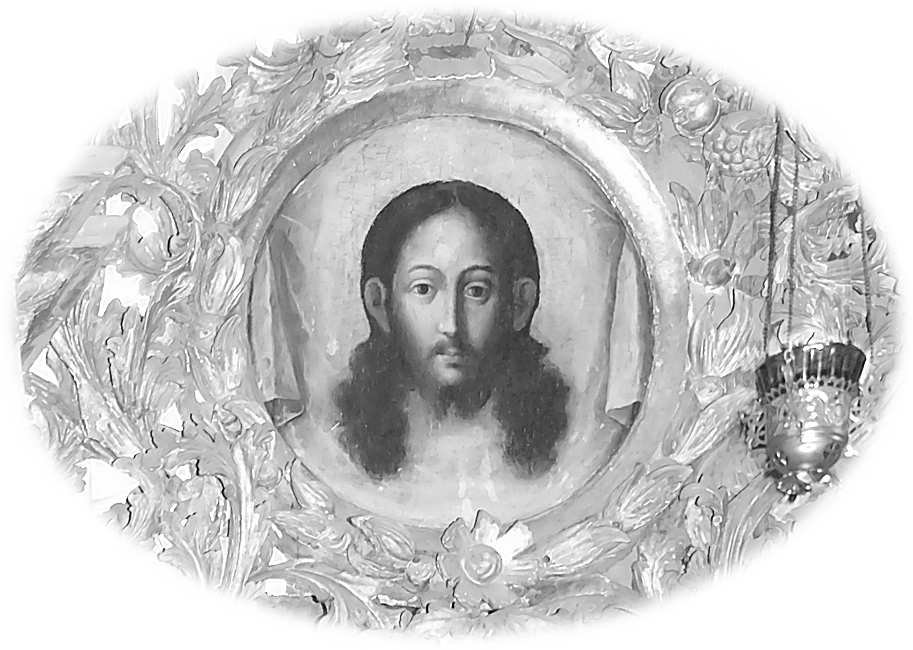 Vernicle Savior from iconostasis of Savior Transfiguration church in Sorochintsy, 1732.
Vernicle Savior from iconostasis of Savior Transfiguration church in Sorochintsy, 1732.Original text translated by Victor Yershoff
- Great artist signed the letters and documents the brief last name «Vedel». The father of composer in a letter to the Kyiv governor general writes: «I have only-begotten son Artem Vedelsky», — and signs: «Kyiv petty bourgeois Lukyan Vedelsky». [↩]
- Musicians must be employed to provide their life. [↩]
- This most incomprehensible for distant from God people ascetic exploit requires abandonment from all blessings of this world (and among them — from human respect and mutual understanding), that to free a heart for continuous internal, to nobody unknown divine service. This exploit is indissolubly related also to secret service near: by prayer, warning, exposure of deceitfulness of this world, strengthening in doles, by the reminder of sense of life. Imaginary madness, and more precisely, incomprehensible on the face of it actions which have deep spiritual maintenance expose victory the greatest measure over the carnal philosophizing and as though will realize opinion of Apostle : «Wisdom of this world is madness before God. Let nobody does not cheat himself. If some of you think to be wise in this world, that be reckless, to be wise» /1st Corinthians 3:19, 18/. Giving himself on jeers, neglect and flouts (especially it is an exploit for people known and respected), God’s fools in the protracted fight overcome the root of all passions — many-sided pride, obtain veritable spiritual freedom and become the living dwelling Divine, full of the gifts of Spirit Saint: by love, gladness, peace, patience and others like that. [↩]
- Using trade of Italian school, exemplary for that time, the Ukrainian composers of the XVIII century managed to fill with its spiritual maintenance and to paint with especially national color. Jointing two cultures: east (Byzantium) and western, our artists cherished a fully original art. Therefore accusing of them of «worship for Italy» is only consequence of unperception of this art, very different from Russian one. [↩]
- Complete collection of А. Vedel works is published in Kyiv, 2007 in «Kyiv Choir library», edited by M. Gobdich, T.Gusarchuk. [↩]
